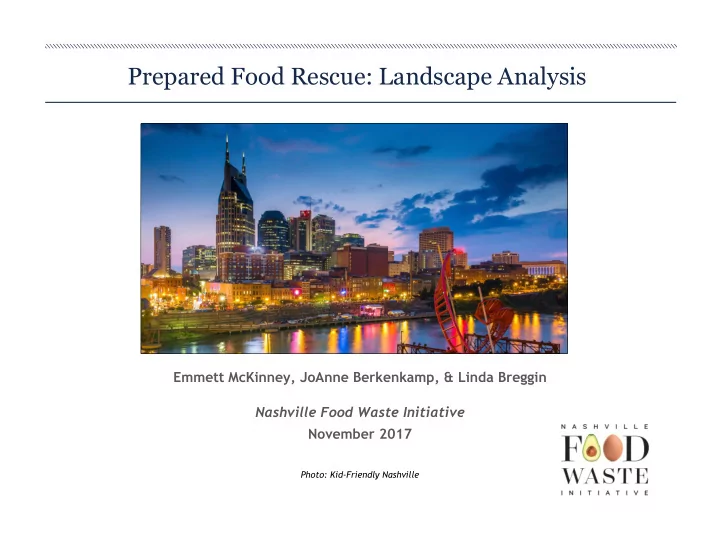

Prepared Food Rescue: Landscape Analysis Emmett McKinney, JoAnne Berkenkamp, & Linda Breggin Nashville Food Waste Initiative November 2017 Photo: Kid-Friendly Nashville
The Nashville Food Waste Initiative • Pilot project led by Natural Resources Defense Council to engage govt., businesses, non-profits, and community in reducing food waste. • Developing strategies and practical tools to serve as models for cities around the country. Prioritize actions in line with EPA Food Recovery hierarchy • • Set goals and track success. REDUCE RECOVER RECYCLE Wasted Food Edible Food Food Scraps Image: http://recycleforlewisham.com/tag/food-waste-2/
Background: Meal Gap in Davidson County 16.4% of Nashvillians estimated to be • food insecure Meal Gap: 19.3 million meals in 2015 • 45% of that need met by current • donations (from all sources Remaining gap: 10 million meals / yr • Additional 23% of meal gap could be • met by rescue from restaurants, institutions & caterers.
Methods Through public databases, identified 60 LMOs • that provide prepared meals in Davidson County. • Targeted outreach to restaurants and institutions. Input gathered from: • 28 Last mile organizations (18 interviews, 10 • survey responses) 9 institutions (6 interviews, 3 survey • responses) 7 restaurants (4 interviews, 3 survey • responses) Photo: Thomas / Flickr
Landscape Analysis for Donation of Prepared foods • What are the current rescue and donation practices of LMOs and area businesses related to prepared foods? • What challenges do they experience? • What capacity and interest do LMOs and potential donors have in expanding donation efforts for prepared food? • What interest and concerns do LMOs and potential donors have about a smartphone application to support rescue of prepared food in Nashville? Photo: Wikimedia Commons
Findings: Last Mile Organizations • LMOs are extremely diverse in their needs, operational dynamics, and objectives. LMOs are interested in receiving more • prepared food (7 out of 10). 48% said they could increase the number of • meals served by modest amounts with their current staff and facilities . • 52% have limited capacity to increase number of meals and would likely replace purchased food with donated food. Photo: Wikimedia Commons
Findings: Last Mile Organizations The biggest barriers to expanded meal • services are funding / staffing and storage Most LMOs are able to obtain the food • currently needed whether through purchases or donations. • Most donations are scheduled pick-ups / during business hours. • Few LMOs have staff or volunteers to pick-up or receive donations late at night or on weekends. Roughly half of LMOs say they have both • capacity and interest in receiving more prepared food. Photo: NRDC Wasted
Findings: Institutions Strong potential among institutions that do large- • batch preparation (vs. cook-to-order). The days and times when surplus food becomes • available vary widely across institutions. • Institutions that currently donate are very interested in expanding donations (8 out of 10). Those that do not currently donate expressed • moderate interest in starting (6.75 out of 10). • Key challenges for institutions include logistical challenges , liability concerns , and awareness of organizations to receive or pick up donations. Photo: NRDC Wasted
Findings: Restaurants and Caterers Businesses that currently donate expressed a strong • interest in expanding donations (10 out of 10 average rating). • Businesses that do not currently donate reported being more hesitant to start (5 out of 10 average rating). Food donations are most likely to be available on • weekends, or sporadically . • Key challenges include staff time, cold storage space, food safety concerns, and the perceived reliability of partners. • Restaurants reported limited awareness of federal tax incentives and Metro guidance on safe donation practices . Photos: Top: Marco verch, Bottom: NRDC
Perceptions of a Smartphone Application • LMOs are generally enthusiastic about a How interested would you be in using a smartphone app for prepared food smartphone application for food donation, but donations? (All respondents) lack staff and volunteers to use it outside their business hours. 10.0 Average Interest Rating • Restaurants and institutions expressed more 8.0 limited interest. 6.0 7.5 Current donors are more interested in an app than • 6.4 6.5 non-donors. 4.0 • Any app must be easy to join , work well the first 2.0 few times it is used, and involve a critical mass of users and food offerings to be successful . 0.0 • Other challenges will also need to be addressed.
Summary: Challenges for Increased Prepared Food Rescue LMOs Shared Concerns Potential Donors Liability Concerns • Funding • Food Safety • • Knowledge of • Lack of volunteers to potential donation pick up food outside • Staff time partners of business hours Cold storage space Reliability of partners • • • Finding high-quality donations, especially • Cost of packaging • Unaware of tax meat and produce incentives and local health regulations
Moving Forward 1. Prepare and share educational materials for donors on liability protections, tax incentives , and Metro guidance on safe food donation . 2. Facilitate LMO/food donor connections . 3. Consider NRDC-supported packaging pilot . 4. Engage with Metro Health inspectors . 5. Consider smart phone app if additional food volumes and interest warrant it. 6. Share these results with potential funders to spur dialogue about funding needs. 7. Expand public recognition initiatives such as the Mayor’s Restaurant Food Saver Challenge. Photo: Wikimedia Commons
Recent Updates • Fliers on tax incentives, liability protections, and Metro Public Health Dept. guidance on safe donation. Matchmaking between prepared food donors and local • non-profits • Packaging pilot for food donation. Building relationships between donors, non-profits, • community, and city. • Recognizing food waste prevention efforts.
Thank you! Nashville Food Rescue Landscape Analysis: www.eli.org/food-waste-initiative/partner-resources JoAnne Berkenkamp: jberkenkamp@nrdc.org Linda Breggin: breggin@eli.org Emmett McKinney: foodwaste@eli.org Twitter: @NashFoodWaste Nashville Food Waste Initiative: www.nrdc.org/resources/nashville-food-waste-initiat ive Nashville Food Saver website: www.nashvillefoodsaver.com
Recommend
More recommend